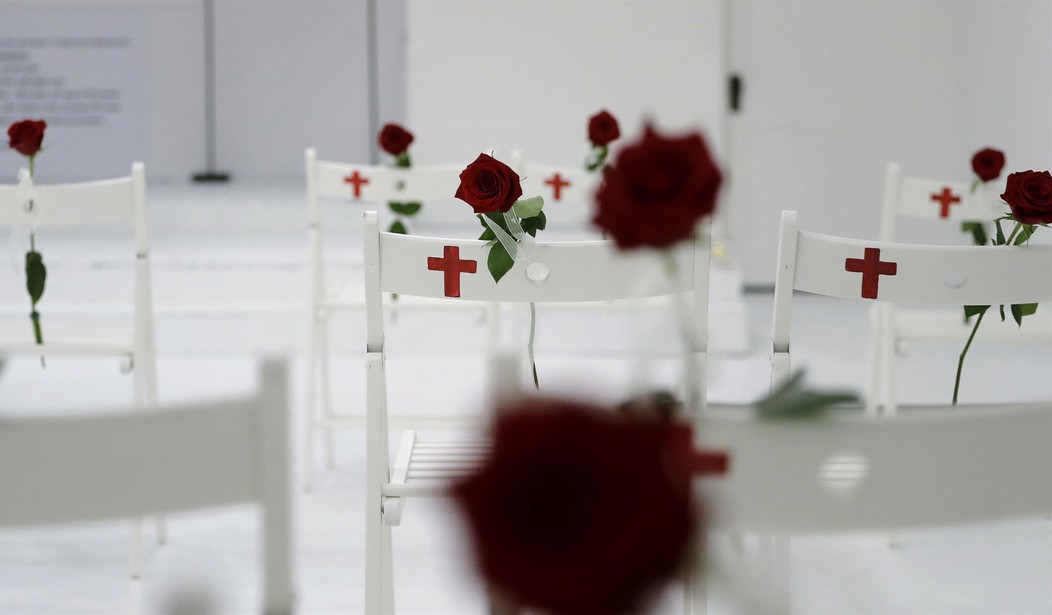We should all be able to agree that houses of worship should be places we can feel completely and totally safe. However, that’s not the reality. Mass shootings can happen anywhere, and churches seem to be a popular target for the depraved minds that want to carry out such an attack for various reasons.
Yet over at FiveThirtyEight, they highlight how some have responded to two different high-profile mass shootings in churches.
This is a tale of two pastors and two mass shootings.
On a balmy June evening in 2015, a young man with a blunt bowl haircut walked into the Mother Emanuel African Methodist Episcopal Church in Charleston, South Carolina, to join a Wednesday night Bible study. As the worshipers closed their eyes in prayer, the man fired at least 70 shots, killing nine people. Among the dead were Ethel Lee Lance, the mother of the Rev. Sharon Risher, and two of Risher’s cousins.
Two years later, on a bright Sunday morning in November, a man in a skull face mask fired some 700 rounds outside and inside the First Baptist Church of Sutherland Springs, Texas, leaving at least 20 people injured and 26 dead. A pregnant woman, her unborn baby and the 14-year-old daughter of the church’s pastor, Frank Pomeroy, were among those killed.
This is also a tale of two very different responses to tragedy and trauma.
Both pastors buried their dead, mourned their incalculable losses, read their Bibles, prayed and eventually returned to their ministries. But Risher, a nondenominational Christian pastor, dedicated herself to gun-law reform and reducing access to weapons. Pomeroy, a Southern Baptist, armed and trained his church members and routinely wears his weapon in the pulpit.
“To me, being a follower of Jesus means that I will always advocate for nonviolence,” Risher told me from her home in Charlotte, North Carolina, just a few days after the sixth anniversary of her mother’s murder. “My thinking is, I don’t condemn anyone for owning a gun, but I want people to realize the power of the violence they hold in their hand when they have a gun. And that just because you have a right to own a gun does not mean you have to exercise the right to use it.”
Now, I think nonviolence is, generally, the best way to approach most things. A nonviolent response is often far more likely to get attention and provoke sympathy for your case, as an example.
However, I also recognize that some people are going to be violent and only a violent response.
Risher says she doesn’t condemn people for owning a gun but also argues that just because you have a right to own one doesn’t mean you have to exercise your right to use it. Frankly, I don’t know anyone who would disagree with that. If this is the totality of her position, I don’t see why she’s calling for the reform of gun laws.
After all, the gun laws that she wants reformed aren’t exactly telling people they don’t have to use a gun. We don’t have any laws on the books that tell a private citizen they need to use a firearm at any point except for laws that require a shooting test to get a concealed carry permit.
However, not everyone responds that way.
Pomeroy, who has a military background and grew up hunting, sees carrying a gun as an extension of his responsibility to protect his flock. He is both licensed and trained to use a handgun and often carried one before the shooting at his rural church.
“God has endowed some of us with the capability to be a warrior and others not,” he said, sitting at his dining room table during a video interview. “Some are on the frontline, and some are in the supply room. Both are equally important, but they’re gifted in different ways. And that’s why it’s important that we go to the Lord and seek what we’re supposed to do individually. And then if he says, yes, carry that firearm, I have no problem carrying that firearm.”
Obviously, I tend to lean more toward Pomeroy’s way of thinking.
Others do not, and FiveThirtyEight highlights a number of them.
As I’ve noted before, I have some inkling of what these two pastors experienced. I’ve lost someone I care about to a mass shooter. In the moments after learning of what happened, I couldn’t help but question whether I’d been wrong for all these years or not. It didn’t take long to remember that it’s not the tool that’s at fault, it’s the tool using it, but I still have some sympathy for those who reach a different conclusion.
They’re wrong, but I understand why they’re wrong.
It’s easy to think of mass shootings creating gun control activists, and that’s true to some extent, but we’ve seen a number of instances where someone was pro-gun before a shooting and maintains their pro-gun stance afterward. Sometimes, even more so.
This is a prime example of two people impacted by two very high-profile shootings who responded differently.







Join the conversation as a VIP Member